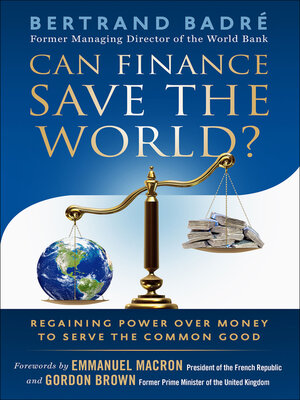Can Finance Save the World?
ebook ∣ Regaining Power over Money to Serve the Common Good
By Bertrand Badré

Sign up to save your library
With an OverDrive account, you can save your favorite libraries for at-a-glance information about availability. Find out more about OverDrive accounts.
Find this title in Libby, the library reading app by OverDrive.



Search for a digital library with this title
Title found at these libraries:
| Library Name | Distance |
|---|---|
| Loading... |
“A hugely important book [with] a compelling vision for ethical global finance that makes current political debates seem petty and thoughtless” (Lawrence H. Summers, former U.S. Treasury Secretary).
According to Bertrand Badré, finance is neither inherently good nor bad. It's just a tool—the most powerful tool on earth. . In Can Finance Save the World?, he describes innovative approaches and financial tools that can help us address many of the world's biggest problems, ranging from climate change to the eradication of poverty to building much-needed infrastructure. Badré details options for creating positive financial regulation and for strengthening international cooperation. He also explains what is working and what needs to change in financing the sustainable development of the world.
This book is rich with practical examples, some developed by Badré himself. For instance, he describes how at the World Bank he devised an innovative way to use insurance, a financial tool rarely considered in international development, to buttress fragile emerging economies against natural disasters and pandemics. Initiatives like these show that, as Badré writes, “when controlled and used intelligently, with benevolence and inventiveness, finance can accomplish great things.”
According to Bertrand Badré, finance is neither inherently good nor bad. It's just a tool—the most powerful tool on earth. . In Can Finance Save the World?, he describes innovative approaches and financial tools that can help us address many of the world's biggest problems, ranging from climate change to the eradication of poverty to building much-needed infrastructure. Badré details options for creating positive financial regulation and for strengthening international cooperation. He also explains what is working and what needs to change in financing the sustainable development of the world.
This book is rich with practical examples, some developed by Badré himself. For instance, he describes how at the World Bank he devised an innovative way to use insurance, a financial tool rarely considered in international development, to buttress fragile emerging economies against natural disasters and pandemics. Initiatives like these show that, as Badré writes, “when controlled and used intelligently, with benevolence and inventiveness, finance can accomplish great things.”







